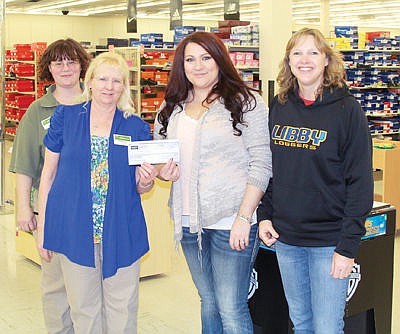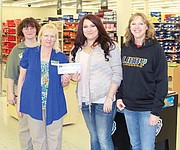Shopko grants help school programs
During the course of the past few weeks, schools in both Libby and Troy have benefitted from community grants awarded by the Shopko Foundation.
Libby schools were awarded, for the fifth consecutive year, $2,000 to be used to help support student educational activities. Troy schools were awarded two grants totalling $500, one for an adult mentoring program and one to help fund a student council trip to the National Student Council Conference to be held later this year in Portland, Ore.
The adult mentoring program in Troy begins in the 2016-2017 school year and involves “purposely selected” adults from the community coming into the school to meet with one or two upperclassmen each. The mentors will lead discussions with the students about goal-setting, future planning and decision-making.
“The adult mentoring program will start next year and will entail adults from the community who have been purposely selected,” said Troy High School principal and schools superintendent Dr. Jacob Francom. “They will come in once or twice a month and eat lunch with one or two juniors or seniors. During this time they will be given different topics to discuss to help the student connect with an adult mentor and talk about goals, plans for the future, and how their choices affect their future. Also, this will give them a contact in the community for possible job placement and a personal reference. Youth can never have too many strong mentors in their lives.”
The second grant to Troy will help offset some of the costs of students travelling to Portland, Ore., later this year to participate in the National Student Council Conference.
Troy student officer Riley Maggi said she is excited about the prospect of attending the conference.
“I am very excited to learn from different student councils across the country to better our school, community and improve the experience at Troy High School,” she said.
Fellow student council member Austin Weideman agreed with Maggi’s sentiment.
“Going to Portland will expand our horizons and will give us fresh ideas to improve our schools,” he said.
The student council is still seeking additional financial assistance for the trip, scheduled for June 24 through June 26.
Libby schools were awarded $2,000 by the foundation, which will be split between the middle/high school and the elementary school. High school principal Ruth Vanworth-Rogers said this is the fifth consecutive year the Shopko Foundation has donated $2,000 to the Libby schools, bringing the total donation to an even $10,000.
Rogers said the money, intended to help support educational activities for students, will be used to help pay the costs of student field trips. The trips, she said, would not be possible without the funding support.
“We are so pleased to have an organization like Shopko to help provide opportunities for students,” she said. “Their generousity helps us provide opportunities our students wouldn’t have otherwise.”
The $1,000 given to the elementary school, principal Ron Goodman said, will be put in the Kids For Kids account. The money in that account is used for projects decided upon by the students at the school. Goodman said the students are discussing some round tables for the cafeteria as well as some new playground equipment.
The foundation also provided a $150 grant to help fund the senior party to be held at the end of the school year.
Local Shopko manager Marion Craig said she was pleased to be able to help provide much-needed support to the community.
“I’m glad we are able to do this,” she said. “It’s nice to be able to help our local community.”
Francom said he is thankful for the foundation and its desire to help ensure the success of local students and schools.
“Shopko has been a great partner in helping us improve our school,” he said. “We really appreciate their community involvement and attention in helping some of our programs and activities be successful. This monetary support allows to run these programs and activities that otherwise would not be able to function.”



